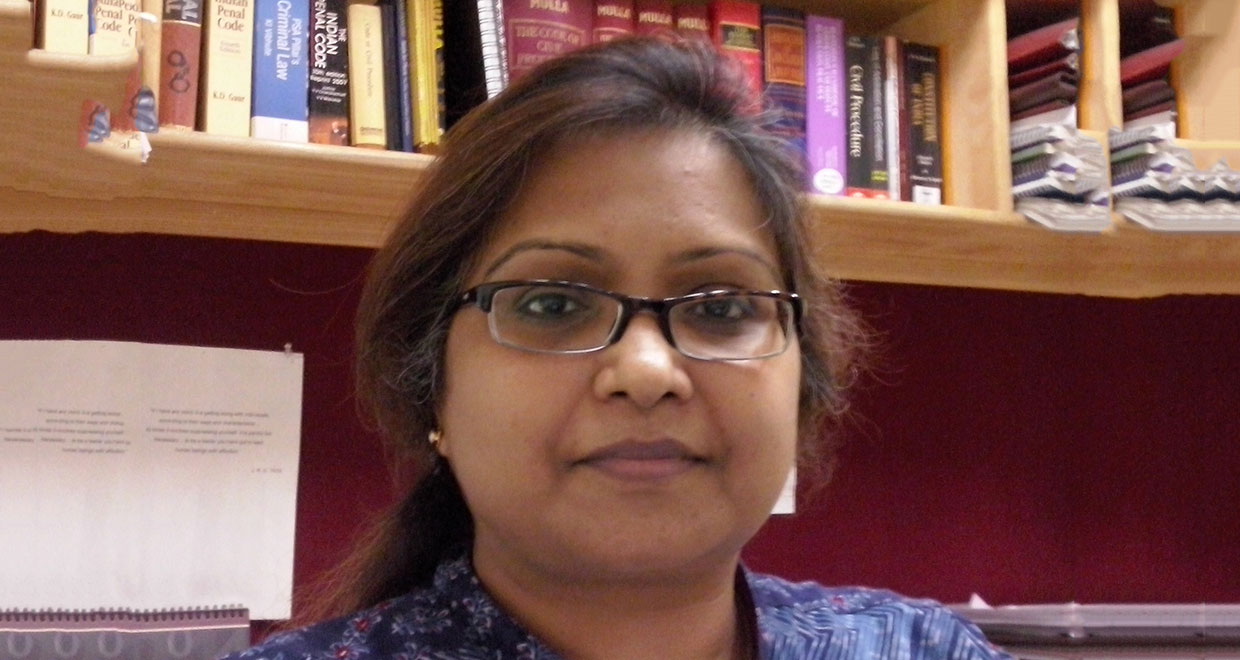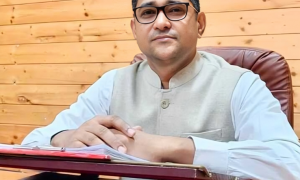Ruhi Paul studied law at Delhi University and graduated in 1999. She practised for four years before choosing to enter the world of academia. She also holds a Master Degree offered by Guru Nanak Dev University and Ph.D. (Mediation law) from NALSAR University of Law, Hyderabad. She has worked as an Assistant Professor at Department of Law, Guru Nanak Dev University, NALSAR and NLU, Delhi. Presently, she teaches Civil Procedure, Law of Limitation and ADR at National Law University, Delhi as an Associate Professor. She was also involved in a training programme on Civil Procedure & Arbitration Laws for Controller Generals of Indian Defence Accounts Services.
In this interview she talks about:
- Teaching at National Law University, Delhi
- Tips on excelling in academics
- Accessibility and uniformity in NLUs
How did you decide to opt for the field of law?
As any other young enthusiastic girl, I wanted to join the field of law to help the masses to get justice. I was very fascinated by the idea that simply studying law is empowering in itself as we get to know of our rights and duties.
Do you feel that the legal profession has significantly changed from the time when you decided to study law?
Yes, the legal profession has changed for better. The base of any profession is research and research has become so easy with all the online resources available now. However, sometimes I miss the long periods we used to spend in the libraries.
You studied law at Delhi University. Which areas of the law fascinated you the most as a law student?
As a student, I was fascinated by Jurisprudence, Constitutional Law, International Law and Criminal Law. The best strategies according to me was listening very carefully to the lectures in the class, making very good books as base books for the subject and reading the related case laws very minutely.
Your Ph.D. thesis was on mediation law. Why did you choose mediation law in particular? What factors should a legal academic consider while choosing an area of specialization apart from personal interest?
I chose mediation as I had developed an interest in Alternative Methods of Dispute Resolution (ADR) well before I decided the topic for my Ph.D. thesis. I was teaching ADR at NALSAR University of Law, Hyderabad and I was fascinated by the idea that some disputes can be resolved in ways other than through courts using amicable methods which have the potential of improving human relations apart from resolving disputes. I also realised that Mediation is one such method which is not being researched and used in India as much it is used and researched upon in foreign Jurisdictions. So I decided to do research in Mediation and how it is being administered in India through courts. My Ph.D. is the first Ph.D. on mediation in India.
A researcher should consider how his/her research can supplement the knowledge about the topic and how relevant the topic is in the contemporary times.
You currently work as an Associate Professor of Law at National Law University, Delhi. What prompted you to choose teaching as a career?
I had a short stint of four years at the Bar before I switched over to academics and pursued higher studies. While I was practising, I felt that I could be more productive if I joined teaching. As in teaching I can help a larger section of society through equipping young students with not only legal acumen but also lots of other life skills like positive thinking, taking responsibilities, team work, sensitivity towards others, leadership qualities, time management, stress management, etc. I feel that these qualities can help a law student to not only become a successful professional but a responsible citizen of India. This can automatically improve not only the Bench and Bar but the entire society.
Tell us about your teaching methodology. Do you encourage students to take notes or do you engage your students in active class participation?
I practise an interactive teaching methodology. I do not encourage students to take notes. I want a class which is alive and participative. I never mind my students asking questions. In fact, I feel motivated to teach a class which is fully prepared for the topic beforehand or the students who generally have an inquisitive bent of mind.
Teaching is something which gives me lot of satisfaction at the end of the day as it is a learning process for me as well. I have to keep myself updated to face the students.
What subjects are you currently teaching? What are your current research interests? Have you involved your students in your research?
Currently I am teaching Civil Procedure, Law of Limitation and ADR. My practice at the Bar has really helped me in my teaching of procedural subjects. My current research interest is to delve deeper into the field of mediation. I am planning to write something like Jurisprudence of Procedural Laws to make the learning of procedural subjects interesting for students. Presently, students find it very hard to concentrate in procedural subjects as they try to learn it like any theory subject. I try different interesting ways to teach procedural laws and try to give practical based research projects so that students gets a deeper understanding of procedural laws. Yes, I have involved students in my research and it was a great combined learning experience for all of us.
Do you think students should treat their professors like friends, or is it necessary to maintain a disciplined environment to create a good classroom environment?
I think some bit of discipline is always necessary for anything that we do in life. I feel that in the classroom there should be a disciplined environment for a serious learning experience for both the teacher and the taught. Outside the classroom, the Professors should be friendly so that the students can approach them for discussing their study related and other problems. I think that we teachers have a larger role to play in the lives of our students and so we have to playing different roles like that of a strict teacher, parent, friend, guide, mentor, etc.
Could you give our young readers certain tips on excelling in academics? As a teacher what tips do you give to your students for proper understanding of a subject?
As a student, I used to make it a point to listen very carefully to whatever was taught in the classes. I think students should read the law (bare Acts, etc) very minutely to understand what the legislator is trying to say and why a particular law is being made. Reading cases related to the subject is also very helpful in understanding how the law is applied to real life situations. Most importantly, students should be very sensitive to what is happening in their surroundings as the understanding and application of law becomes very simple if one has lots of real life experiences.
I strongly suggest students not to go for cramming or following any other short cuts just to pass in exams. Students should understand that they have a very important role to play in building up of the future generation and so they should choose wisely what they want to do in life and do it vey sincerely.
You were involved in the training programme on Civil Procedure & Arbitration Laws for Controller Generals of Indian Defence Accounts Services. What were the most intellectually stimulating aspects of this experience?
The most stimulating aspects of this experience is the fact that I have to offer sessions to people who most of the times are very senior officials and experts in their field. To offer orientations in Legal subjects, one requires a totally different type of methodology than teaching young law students. I really enjoy the practical application based questions from the trainees. I also like the fact that I need to design the course according to the need of the trainees who might not be having any legal background but who require an understanding of these areas of law in their work field.
When would you say a legal academician is ready to start writing books? Any time management tip for budding legal academicians?
Research is very essential for academics and it is a continuous process. I think there is no hard and fast rule as to what the right time is for an academician to start writing a book. Whenever an academician thinks s/he has acquired sufficient understanding of a topic/phenomenon/ process, both practically and theoretically, and his/her research will add something to the already existing literature on the topic, s/he can start writing a book. An academician can also refine his/her research while writing the book and so it is perfectly fine if s/he is digressing from the original research plan.
We always can find time to do what we really want to do in life so I think there is no problem of finding out time for research or for any other work from our regular schedule. I sincerely believe in the saying, “When there is a will, there is a way”.
For budding legal academicians, I want to say firstly, that they should enjoy life because life is a gift from God that we get only once. Secondly, when they work/ study/research than also they should do that with the same zeal and enjoyment. Your work will give you respect, authority, fame, livelihood and satisfaction.
A common perception in the student community is that the curriculum in most NLUs is outdated and does not equip the students with the skills that they need to solve real life problems. What are your thoughts about this perception?
I, humbly, don’t subscribe to this view. All the law schools follow a very flexible approach to curriculum design. The faculty is given a lot of space to design courses and are encouraged to keep updating the syllabi with the changes in the law. Apart from the basic courses, law schools have clinic courses which help a student to understand ADR mechanisms, drafting of pleadings and conveyancing, application of law in courts/tribunals, etc. Law schools also have extensive internship programs to enable students to have an experience of working with various organisations. In NLU, Delhi, we have library internships for first year students, NGO intersnships for second year students, Trial advocacy for third year students, appellate courts internship for fourth year and fifth year students. Law schools also have research centres which provide a forum for the students to get involved in various research projects, most of which are empirical in nature. In NLU, Delhi, presently, students are involved in the Clinic on death row prisoners, legal aid work, construction workers, gender issues, etc.
Another concern that is often raised is that the NLUs are beyond the reach of hardworking students who lack the economic resources to study in these prestigious institutions. What steps should be taken foster more equality in the NLUs?
At NLU, Delhi, we offer scholarships to students who lack economic resources. Sometimes, full fee waiver is also granted, if the circumstances require it. Various legal and other institutions can also have schemes of sponsoring the student’s studies. Initiatives like IDIA are good and should be extended to all institutions.
The students who lack economic resources can also be allowed to do part time work in the libraries, etc to earn their pocket money while they stay in the law school.
NLUs in India have often been described as islands of excellence amidst a sea of mediocrity. What steps should be taken to usher in greater uniformity in the quality of legal education in the country?
I think the law schools and the Law universities and colleges should start working together. By working together, uniformity can be brought in legal education. There can be arrangements for exchange of faculty, certificate courses can be offered to students in law schools on subjects of their choice, law schools can have trainings for teachers in course designing and teaching methodology, etc. NLU, Delhi has Academy for Law Teachers which conducts training and workshops on regular basis. Joint research programs can be initiated.
Any important things which law school didn’t teach you but ‘teaching’ did?
Teaching has taught me lot of patience, the ability to see things from a wider perspective and self-control. Teaching has taught me to be a student of law for the rest of my life.
Lastly, what would be your message to people who want to take up a career in teaching?
Teaching has always been a very respectable profession. Teaching as a career is highly satisfying. Now a days, even the financial aspect is not a concern if you want to join teaching. It is a field which will help you to learn throughout your life by keeping you involved with bright, young and enthusiastic people. Teaching gives you the power to shape the future generation and with it comes the high responsibility to do this with great care and concern for the values of the society, the nation and the world as a whole.


























